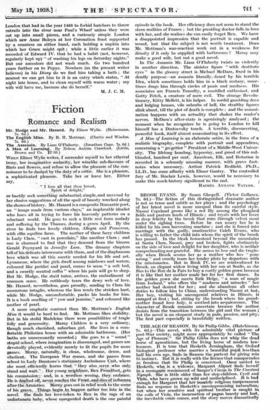London Lore
Wanderings in Medieval London. By Charles Pendrill. (Allen. • Illustrated. 10s. 6d.)
Losrnox is like Africa. The main features of both are now explored and tolerably well known, but there are, even in the Metropolitan Continent, hundreds of dark corners into which the curious antiquarian can push, and which will yet yield some secret of history or folk-lore, or some long-forgotten name, or vanished custom... But, to get a return for his labour, the seeker must bring knowledge with him to the search, and this is what Mr. Pendrill has done : he has steeped himself in the knowledge of all sorts of mediaeval rolls and chronicles, and with a light pleasant touch he brings his acquisitions to bear in resurrecting certain parts of old London within the Wall. The author calls his work " a book of digressions," and so it is ; but we are always pleased to go wherever Mr. Pendrill's learned fancy chooses to lead. To Stew Lane and Darkhouse Lane for instance, two narrow alleys at Queenhithe, which lead down .to the river. Darkhouse Lane still justifies its title, but laundresses no longer ply their trade on the " lauendresbrigge " at its foot. Stew Lane merely denotes the presence of a stew or public bath-house for one sex only, though the admission of both later on gave the name an unsavoury twang. There was a man's stew in Seacoal Lane near Ludgate Circus " where not even a washerwoman was allowed to enter."
In the eighteenth century between London Street and Fenchurch Street there lay a turning out of Mark Lane known as Blind Chapel Court, which is now, however, engulfed in offices. This name commemorates the last vestige of the Mediaeval manor of Blanchappleton, whose mark, or territorial jurisdiction, may possibly have given its name to Mark Lane. The chapter on the Gilds' of London is full of infor- mation on the City's commercial economy and on the very stringent conditions that London's mediaeval freemen were able, to impose on foreign traders. Another chapter entitled " The Garden City" draws a pleasant picture of our Town when " the open country reached right up to the City Walls, interspersed,-with:farm@ and.dairics whickaeryed the_ citizens with a substantial part of their food." But even with all that sweet country roundabout it was an _unpleasant enough London that had in the year 1488 to forbid butchers to throw entrails into the river- near Paul's Wharf unless they were cut up into small pieces, and a curiously simple London which saw Anne Boleyn at her Coronation feast supported by a countess on either hand, each holding a napkin into which her Grace might spit ; while a little earlier it was recorded of Edward IV. that he had a habit (not, however, regularly kept up) " of washing his legs on Saturday nights." But our ancestors did not wash much. Go two hundred years further on to Pepys. Nowhere (so the present writer believes) in his Diary do we find him taking a bath ; the nearest we can get him to it is an entry which states, " At night late home, and to clean myself with warm water ; my wife will have me, because she do herself."
M. J. C. M.























































 Previous page
Previous page